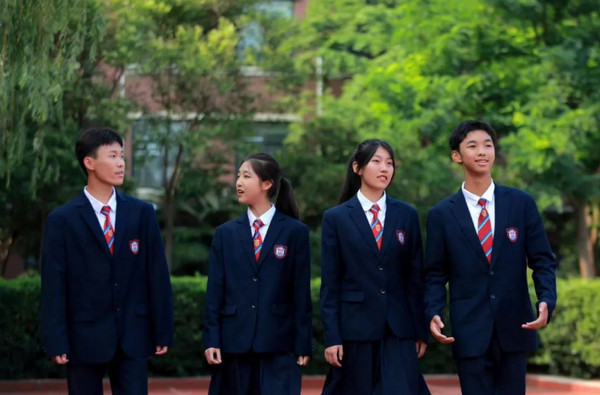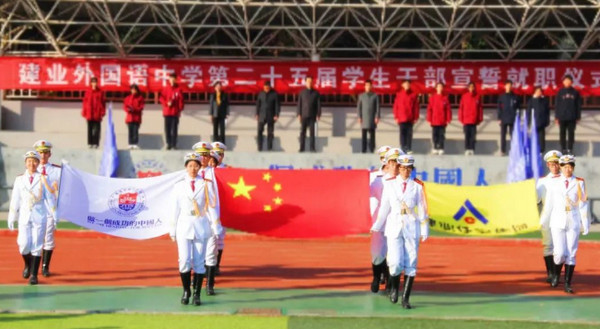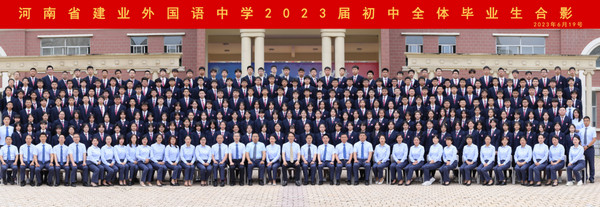建业外国语中学评估政策
Jianye International School (JYIS) Assessment Policy
1. 建业外国语中学使命宣言 JYIS mission statement
建业外国语中学,以“做一个成功的中国人”为校训,秉 “精品教育奉献社会”之宗旨,承“教育 让生命更美好”之使命。学校与学生、家长、社区、政府以及其它国际教育机构、组织共同打造中西融合的多元文化成长环境。培养具有“民族情怀、国际视野、领袖气质”的终身学习者,为“教育让世界更美好”贡献自己的力量。
Jianye International School takes "We Are Heading for Success" as its motto, adheres to the tenet of "Quality Education, Contribution to Society" and undertakes the mission of "Better Education, Better Life". The school, together with students, parents, communities, governments and other international educational institutions and organizations, creates a multicultural growth environment integrating Chinese and Western cultures. We cultivate lifelong learners with "national feelings, global vision,leadership", and contribute our own strength to "Better education, Better world".
2.支持学生学习的评估理念 Philosophy of assessment that supports student learning
评估在我校办学理念和育人目标的实现过程中起着关键作用,通过评估,提供学生学习过程的信息反馈,教师得以追踪和诊断学生的进步,从而更好地改进 和支持学生的学习,最终培养学生成为具有国际情怀的终身学习者。学校和教师将有效、全面地评估学生,并客观地报告给家长和学生。
Evaluation act a key role in the realization of school philosophy and education goal of our school. By providing information feedback on students' learning process, teachers can track and diagnose students' progress, improve and support students' learning, and eventually train students to become lifelong learners with international feelings. Schools and teachers will evaluate students effectively and comprehensively and report to parents and students objectively.
3. 评估目的 Purpose of assessment
通过评估,教师能够确定学生在不同阶段知道什么、理解什么、有能力做到什么,以及能感受什么,据此教师调整和改进教学计划,为教师实现教学目标提供衡量依据。
Through evaluation, teachers can determine what students know at different stages, understand what they are capable of doing, and what they can feel. Based on this, teachers can adjust and improve their teaching plans to provide measurement basis for teachers to achieve teaching goals.
同时, 评估为学生的学习提供证据和反馈, 使他们了解自身学习情况,更好地改进学习,设定合适的学习目标,从而掌握批判性思维和自我评估技能。
At the same time, assessment provides evidence and feedback for students' learning, enables them to understand their own learning situation, improve their learning and set appropriate learning goals, so as to grasp critical thinking and self- assessment skills.
此外, 我们也要求家长对学生进行评估, 这样家长有机会参与学生学习, 可 以与孩子和老师一起制定学生的学习目标。
In addition, we also ask parents to evaluate their students, so that parents have the opportunity to participate in student learning and can work with children and teachers to set learning goals.
4. 评估中的角色 Roles
教师在评估中的角色 Teacher's role in the evaluation
针对学生的学习过程,制定多样、有效的评估政策和方法,并运用于教学; 对评估政策和方案进行评估和改进, 支持学生的学习进步;交流、反思统计数据并不断改进教学工作。
Develop various and effective evaluation policies and methods for students' learning process and apply them in teaching; Evaluate and improve assessment policies and programs to support students' learning progress; Communicate, reflect on statistics and improve teaching.
学生在评估中的角色 Student’s role in the evaluation
诚信评估;分析自己的学习,并了解需要改进之处;学习并逐渐掌握一定的评估技能;完成教师布置的评估,并反映、汇报数据;参与反思、自我评估和同学互评。
Integrity assessment; Analyze your own learning and understand what needs improvement; Learning and gradually mastering certain assessment skills; Finish the evaluation assigned by teachers, and reflect and report the data; Participate in reflection, self-assessment and peer review.
家长在评估中的角色 Parent's role in the evaluation
评估孩子在家庭的表现;为学校提供评估的建议。
Assess children's performance at home; Advising schools on evaluation.
管理人员在评估中的角色 Pedagogical Leadership's role in the evaluation
检查学校评估政策与措施的落实情况;交流、反思统计数据并不断改进工,完善评估体系;对自己、教师的工作进行评估、反思与改进。
Check the implementation of school evaluation policies and measures; Communicate and reflect on the statistical data and constantly improve the work to improve the evaluation system; Evaluate, reflect and improve the work of oneself and teachers.
5. 评估原则 Principle
MYP课程包括三个相互关联的部分:书面课程、讲授课程和评估课程。每个课程都同样重要。MYP评估为教师和学生提供了关于学生学习的可靠且有效的信息。MYP中的评估是基于评估标准的。
The MYP’s coherent curriculum comprises three interrelated components-written, taught and assessed curriculum. Each component has equal value. MYP assessment gives teachers and students reliable and valid information on student learning. Assessment in the MYP is criterion-related.
在进行MYP评估时,教师应考虑学生不同的学习风格和不同的文化经历。教师还需要了解学生在学习过程中的成绩和需要改进的地方。评估反馈应是积极且具有建设性的。
When conducting MYP assessments, teachers should consider students’ differing learning styles and different cultural experiences. It is also advised that teachers need to know students’ achievements and areas for improvement in the learning process. The feedback of assessment should be positive and constructive.
评估应基于评估标准
评估应具有形成性和总结性
评估应是持续的和反思性的
总结性评估任务应具有挑战性、情境性和整体性
评估应在内部标准化
The assessments should be criterion-related
The assessments should be both formative and summative
The assessments should be ongoing and reflective
The summative assessment tasks should be challenging, contextual and integral
The assessments should be internally standardized
6.评估准则Guidelines
MYP所有评估都应基于评估标准
每项评估活动都必须让学生达到最高的成绩水平。
教师应为学生的评估任务提供支持,包括但不限于任务说明、材料和各种资源的支持、协助组建团队、提供专业知识和专业人员的支持等,以使学生达到最高水平。
各学科的教师需要根据学科的术语和必修语言进行总结和评价,教师需要帮助学生掌握和熟练使用学科的特殊必修术语。
在进行评估时,教师应考虑学生的语言背景,以确保他们能够以舒适的语言完成任务。
必须向学生提供每个科目的评估标准副本和评估任务要求。
教师应在学生开始指定任务之前告知任务说明。
教师应提供给学生及时且具有支持性的反馈。
教师必须清楚准确地记录所有评估活动。
教师使用“最佳匹配”方法和专业判断来评估学生的工作。
教师有责任根据学校的学术诚信政策,识别并报告学生在作业中的不当行为。
All assessment of MYP should be criterion-related.
Each assessment activity must allow students to reach the highest level of achievement.
Teachers should provide support for students' assessment tasks, including but not limited to the explanation of tasks, the support of materials and various resources, assist in the formation of teams, provide professional knowledge and support from professionals, etc, so that students can reach the highest level.
Teachers of all subjects need to summarize and evaluate according to the terminology and mandatory language of subjects, and teachers need to help students master and skillfully use the special mandatory terminology of subjects.
While conducting assessment, teachers should consider students’ language backgrounds to ensure they are able to perform well in the tasks with their comfortable languages.
Students must be provided with the copy of the criteria for each subject and assessment task requirements.
Teachers should inform students with the task clarification before they start the assigned tasks.
Feedback to students should be prompt and supportive.
Teachers must keep a clear and accurate record of all assessment activities.
Teachers use “best fit” approach and professional judgments to assess students' work.
Teachers have responsibilities to identify and report students’ malpractice of assignments referring to the school’s Academic Honesty Policy
7. 形成性评估Formative Assessment
形成性评估是一个收集、分析、解释和使用证据以改进学生学习并帮助学生发挥潜力的过程,是课堂实践的一个重要组成部分,需要整合到课程交付中。
Formative assessment represents the process of gathering, analyzing, interpreting and then using evidence to improve student learning and help students’ achieve to their potential. It is one essential component of classroom practice and needs to be integrated into curriculum delivery.
在每个单元的教学过程中,教师应始终对学生进行形成性评估,以帮助学生实现课程的最终目标,并开发MYP的学习方法。
Teachers should give students formative assessments all the way during teaching each unit to help students achieve the final objectives of the subject and to develop learning approaches of the MYP.
教师应使用学生的形成性评估记录,根据学科标准和ATL计划记录学生的形成性表现。
Teachers should use the students’ formative assessment record book to record students’ formative performance based on both subject criteria and the ATL planner.
教师应在教学活动中平衡应用学科标准和ATL纵向和横向规划。
Teachers should consider the balance and frequency of applying subject criteria and ATL vertical and horizontal planner through teaching and learning activities.
在进行总结性评估之前,应设计至少两个相关的形成性评估,为学生做好准备,以展示他们在总结性评估中的全部潜力。
Before conducting a summative assessment, at least two relevant formative assessments should be designed to prepare students so as to demonstrate their full potential in the summative assessment.
形成性评价应及时反馈给学生。
The feedback of the formative assessment should be given to the students timely.
8. Summative Assessment总结性评估
总结性评估根据IB MYP评估标准衡量学生成绩,以判断成绩水平。教师必须了解IB用于进行总结性评估的原则和实践。
Summative assessment is concerned with measuring student attainment against IB MYP assessment criteria to judge level s of attainment. Teachers must be aware of the principles and practices that the IB uses to conduct summative assessment.
教师应为每个单元设计至少一个具有情境性和完整性的总结性单元任务,让学生有机会将在单元中学到的知识应用到现实世界中。
Teachers should design at least one contextual and integral summative unit task for each unit to let students have opportunities to apply what they’ve learnt in the unit under real world situations.
教师应认真评估学生的每个单元任务的表现,并最终得出学生的学期成绩。四个学科标准中的每一个至少应在整个学期的任务中应用一次。
The performance of each unit task should be assessed seriously and it culminates to students’ semester grades. Each of the four subject criteria should be at least applied in the tasks once through the semester.
教师和学生都有责任保留其单元任务的证据,以便进行复习和反思。
Both teachers and students have the responsibilities to keep the evidence of their unit tasks for the purpose of reviewing and reflecting.
教师应正式通知学生总结性评估活动。通知应包括以下方面:
a、 任务内容和概念理解的指示
b、 任务形式,如论文、报告、PPT演示、播客、声音文件等。
c、 待评估的标准
d、 评估准则,包括通用描述符和任务特定说明
e、 任务的持续时间
f、 任务的截止日期
Students should be given notification formally of summative assessment activities. Notification should include the following features:
a. Indication of task content and conceptual understandings
b. Form of the task, e.g. an essay, report, power point presentation, podcasts, sound file, etc.
c. The criteria to be assessed
d. An assessment rubric, including generic descriptors and task-specific clarifications
e. Duration of the task
f. Task’s due date
总结性评估的反馈应及时提供给学生。
The feedback of the summative assessment should be given to students timely.
9.内部标准化Internal Standardization
若不止一名教师教授同一学科组,则必须在授予最终成绩等级之前进行内部标准化。这个过程包括教师会议,就标准和成绩水平以及如何应用达成共识。以此,教师可以提高判断的可靠性。
Where more than one teacher is teaching the same subject group, the process of internal standardization must take place before final achievement levels are awarded. The process involves teachers meeting to come to a common understanding on the criteria and achievement levels and how they are applied. By doing so, teachers increase the reliability of their judgment.
整个学年的标准化可促进一致性,并就MYP目标方面的学生成绩建立共识。
Standardization throughout the school year promotes consistency and builds common understandings about student achievement with respect to MYP objectives.
10.授予学期成绩Awarding Semester Grades
学期学科总结性成绩的授予是基于整个学期各单元任务的表现。根据学生在教师专业判断下的单元任务表现,所有学生的所有学科都应有四个具体标准中每一个的最终成绩水平。
The award of a summative subject semester grade is based on a number of criteria-related unit tasks through the semester. All subjects should be given final level of achievement for each of the four specific criteria according to students’ unit task performances under teachers’ professional judgments.
使用MYP 1-7量表的教师应使用以下年级界限指导表确定MYP每年的最终成绩。该表提供了一种将标准总等级转换为基于1-7分制的等级的方法。应通过确定学生在每个学期期间达到的每个标准的最一致的成绩等级,将MYP标准相关数字等级转换为最终1-7等级。
Teachers using the MYP 1-7 scale should use the grade boundary guidelines table that follows to determine final grades in each year of the MYP. The table provides a means of converting the criterion levels total into a grade based on a scale of 1-7.The transformation of MYP criteria-related numeric grades into final 1-7 grades should be achieved by determining the most consistent level of achievement for each criterion achieved by the student during the course of each semester.
|
分数 |
边界准则 |
描述 |
|
1 |
1-5 |
产出质量非常一般的作品。展示了许多重大误解或对大多数概念和上下文缺乏理解。很少表现出批判性或创造性思维。非常死板,很少使用知识或技能。 |
|
2 |
6-9 |
产出质量一般的作品。表达对许多概念和上下文的误解或有理解上的重大差距。很少表现出批判性或创造性思维。在使用知识和技能方面通常缺乏灵活性,很少应用知识和技能。 |
|
3 |
10-14 |
产出质量合格的作品。传达对许多概念和背景的基本理解,偶尔出现重大误解或差距。开始展示一些基本的批判性和创造性思维。在使用知识和技能方面往往缺乏灵活性,即使在熟悉的课堂环境中也需要支持。 |
|
4 |
15-18 |
产生了高质量的作品。传达对大多数概念和上下文的基本理解,很少有误解或只有小差距。通常表现出基本的批判性和创造性思维。在熟悉的课堂情境中灵活运用知识和技能,但在不熟悉的情境中需要支持。 |
|
5 |
19-23 |
产出高质量的作品。传达对概念和上下文的全面理解。展示批判性和创造性思维,有时还很成熟。在熟悉的课堂和现实环境中使用知识和技能,并在支持下使用一些不熟悉的现实环境。 |
|
6 |
24-27 |
产出高质量、偶尔创新的作品。传达对概念和上下文的广泛理解。表现出批判性和创造性的思维,通常具有复杂性。在熟悉和不熟悉的课堂和现实世界中使用知识和技能,通常具有独立性。 |
|
7 |
28-32 |
产出高质量、经常创新的作品。传达对概念和上下文的全面且细致的理解。始终表现出成熟的批判性和创造性思维。在各种复杂的课堂和现实世界中,经常独立和专业地转化知识和技能。 |
|
Grade |
Boundary guidelines |
Descriptor |
|
1 |
1-5 |
Produces work of very limited quality. Conveys many significant misunderstandings or lacks understanding of most concepts and contexts. Very rarely demonstrates critical or creative thinking. Very inflexible, rarely using knowledge or skills. |
|
2 |
6-9 |
Produces work of limited quality. Expresses misunderstandings or significant gaps in understanding for many concepts and contexts. Infrequently demonstrates critical or creative thinking. Generally inflexible in the use of knowledge and skills, infrequently applying knowledge and skills. |
|
3 |
10-14 |
Produces work of an acceptable quality. Communicates basic understanding of many concepts and contexts, with occasionally significant misunderstandings or gaps. Begins to demonstrate some basic critical and creative thinking. Is often inflexible in the use of knowledge and skills, requiring support even in familiar classroom situations. |
|
4 |
15-18 |
Produces good-quality work. Communicates basic understanding of most concepts and contexts with few misunderstandings and minor gaps. Often demonstrates basic critical and creative thinking. Uses knowledge and skills with some flexibility in familiar classroom situations, but requires support in unfamiliar situations. |
|
5 |
19-23 |
Produces generally high-quality work. Communicates secure understanding of concepts and contexts. Demonstrates critical and creative thinking, sometimes with sophistication. Uses knowledge and skills in familiar classroom and real-world situations and, with support, some unfamiliar real-world situations. |
|
6 |
24-27 |
Produces high-quality, occasionally innovative work. Communicates extensive understanding of concepts and contexts. Demonstrates critical and creative thinking, frequently with sophistication. Uses knowledge and skills in familiar and unfamiliar classroom and real world situations, often with independence. |
|
7 |
28-32 |
Produces high-quality, frequently innovative work. Communicates comprehensive, nuanced understanding of concepts and contexts. Consistently demonstrates sophisticated critical and creative thinking. Frequently transfers knowledge and skills with independence and expertise in a variety of complex classroom and real-world situations. |
11.学校考试School Examinations
在学年的某些时候,所有MYP年级的学生都将参加正式的笔试,主要侧重于知识和理解,以满足当地政府的要求。MYP的评估是与之平行的,与政府要求的义务阶段的审查评估没有冲突。我们将根据课程计划完成总结性评估,并根据国家要求参加规定的考试。
At certain times of the school year, students in all MYP Grades will sit for formal written examinations, which mostly focus on knowledge and understanding to meet the local government requirement. The assessment of MYP is parallel and no conflicting with the examination evaluation of the obligation stage required by the government. We will complete the summative assessment according to the curriculum plan and participate in the prescribed examination according to the state requirements.
如果学生不参加考试(学校和地区统一考试),家长应陪同学生到学校说明情况,并陪同学生参加补考。因主观原因未参加考试的学生,补考成绩按70%计入总分;因客观原因未参加考试的学生,补考成绩按100%计入总分。
If the students do not take the examination (unified examination in school and district), parents should accompany the students to the school to show the situation and accompany the students to take the make-up examination. Students who do not take the examination due to subjective reasons, students' make-up exam scores are included in the total scores according to 70%; Students who do not take the exam due to objective reasons, students' make-up exam scores are included in the total scores according to 100%.
12.MYP社区设计 MYP Community Project
社区项目是探究的一个典例,因为它反映了学生发起、管理和指导自己探究的能力。MYP三年级学生需要单独或以小组形式参与社区项目,这些项目必须由内部主持。
The community project is a culminating example of inquiry because it reflects students’ ability to initiate, manage and direct their own inquiry. MYP Year 3 students are required to participate in community projects either on their own or in groups which must be internally moderated.
13.报告评估 Reporting Assessment
在每学期结束时,向所有学生发布完整的书面学术报告。因主观原因未参加总结性评估的学生将根据不适用情况纳入总结性评估结果,并根据实际情况对家长进行访谈,对学生给予警告和处罚。此外,学生将有机会参加补考,考试结果将列入学生的学业成绩报告。
Full, written academic reports are issued for all students at the end of each semester. Students who do not participate in the summative assessment due to subjective reasons will be included in the summative assessment results according to N/A, and parents will be interviewed according to the actual situation, students will be given a warning and punishment. In addition, students will be given a chance to take a make-up examination, and the results will be included in the students' academic performance report.
14.Homework 家庭作业
“家庭作业是课堂教学的必要辅助手段,所有学生都应该定期做家庭作业。家庭作业旨在加强课堂上的作业,帮助学生养成自律、组织和自立的重要习惯。学生有责任合理安排时间,以管理长期项目。
Teachers expect homework to be done properly and punctually. Failure to do homework is treated seriously and follow-up face-to-face meeting with students and parents will be called if the delay persists.
老师们希望学生能按时完成家庭作业。未完成作业的学生将受到严肃对待,如果拖延持续,将要求与学生和家长进行后续面对面会议。
Teachers expect homework to be done properly and punctually. Failure to do homework is treated seriously and follow-up face-to-face meeting with students and parents will be called if the delay persists.
15. 会议 Conference
教师会见学生的会议 Teacher-student conference
教师会见学生的会议是持续的,每当老师认为需要对学生的学习提供反馈时, 就可以会见学生。
Meetings with students are ongoing and can be held whenever the teacher feels the need to provide feedback on the student's learning.
教师会见家长的会议 Teacher-parents conference
教师有机会与家长分享学生学习的证据以及学习目标,并解决存在的问题,以更好地促进学生之后的学习。
Teachers have the opportunity to share evidence and learning objectives with parents and solve existing problems to better promote students' learning later.
学生主导的会议 student-led conference
学生对自己的成长进行反思,为自己的学习负责。学生与家长一起设立目标,确保能够持续进步。
Students reflect on their own growth and take responsibility for their learning. Students work with their parents to set goals and ensure that progress is sustained.
三方会议 three-way conference
三方会议在每学期学期末由教师、学生和家长三方参加。会议上,学生、家
长和教师讨论以下内容:
The three-way conference is attended by teachers, students, and parents at the end of each semester. At the meeting, students, parents, and teachers discussed the following:
成长档案(作业样本/期望)portfolio; 培养目标(优点及需要改进之处)learner profile; 学生的学习文化及家 庭背景 Students’ learning culture and family background.
会议之后教师提供书面反思。The teacher provided a written reflection after the meeting.
16.MYP的评估与国家课程考试要求相结合 MYP assessment with national requirements
作为郑州市金水区学校, 按照当地教育主管部门要求,我们也要定期参加区域统考。学校会将MYP的评估结果(每学期1次,每学年2次)与区域统考的成绩分开反馈给家长。
As a school in Jinshui district of Zhengzhou, we also need to regularly take the regional unified examination in accordance with the requirements of local education competent authorities. MYP assessment results (once per semester, twice per year) will be reported to parents separately from the local examination results.
17. 评估政策的完善 Revise
在每学年末时(7月-8月), MYP 协调员、所有教师和行政人员将会修订和完善评估政策。
At the end of each school year(July—August), MYP coordinators, all teachers and administrators will revise and refine the evaluation policy.
18. 文献参考 Reference
《 项 目标 准 与实施 要求 》 国际文 凭 组织 2014(International Baccalaureate Organization (2014), Programme standards and practices)
《中学项 目 :从原则到实践》 国际文凭组织 2014(International Baccalaureate Organization (2014), MYP: From principles into practice)




































 您的位置
您的位置



